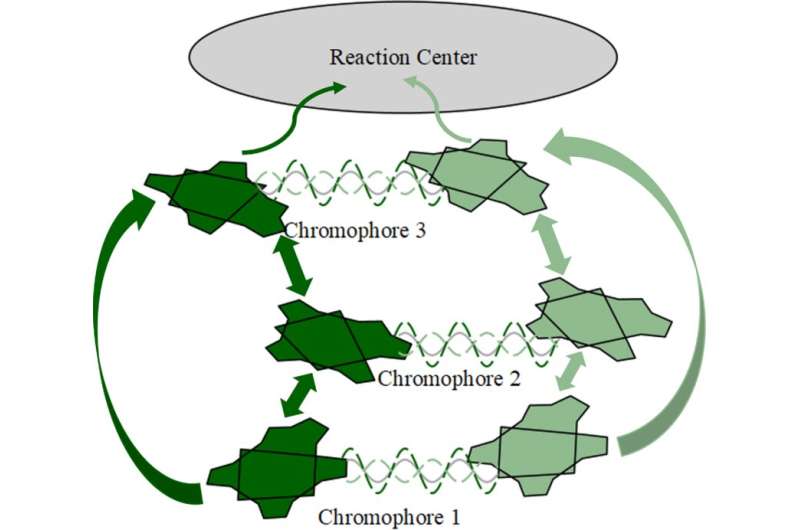Scientists find link between photosynthesis and 'fifth state of matter'
Опубликовано 2023-05-07 16:00 , обновлено 2023-05-07 16:45

Inside a lab, scientists marvel at a strange state that forms when they cool down atoms to nearly absolute zero. Outside their window, trees gather sunlight and turn them into new leaves. The two seem unrelated—but a new study from the University of Chicago suggests that these processes aren't so different as they might appear on the surface.
The study, published in PRX Energy on April 28, found links at the atomic level between photosynthesis and exciton condensates—a strange state of physics that allows energy to flow frictionlessly through a material. The finding is scientifically intriguing and may suggest new ways to think about designing electronics, the authors said.
"As far as we know, these areas have never been connected before, so we found this very compelling and exciting," said study co-author Prof. David Mazziotti.
Mazziotti's lab specializes in modeling the complicated interactions of atoms and molecules as they display interesting properties. There's no way to see these interactions with the naked eye, so computer modeling can give scientists a window into why the behavior happens—and can also provide a foundation for designing future technology.
In particular, Mazziotti and study co-authors Anna Schouten and LeeAnn Sager-Smith have been modeling what happens at the molecular level when photosynthesis occurs.
When a photon from the sun strikes a leaf, it sparks a change in a specially designed molecule. The energy knocks loose an electron. The electron, and the "hole" where it once was, can now travel around the leaf, carrying the energy of the sun to another area where it triggers a chemical reaction to make sugars for the plant.
Together, that traveling electron-and-hole-pair is referred to as an "exciton." When the team took a birds-eye view and modeled how multiple excitons move around, they noticed something odd. They saw patterns in the paths of the excitons that looked remarkably familiar.
In fact, it looked very much like the behavior in a material that is known as a Bose-Einstein condensate, sometimes known as "the fifth state of matter." In this material, excitons can link up into the same quantum state—kind of like a set of bells all ringing perfectly in tune. This allows energy to move around the material with zero friction. (These sorts of strange behaviors intrigue scientists because they can be the seeds for remarkable technology—for example, a similar state called superconductivity is the basis for MRI machines).
According to the models created by Schouten, Sager-Smith and Mazziotti, the excitons in a leaf can sometimes link up in ways similar to exciton condensate behavior.
This was a huge surprise. Exciton condensates have only been seen when the material is cooled down significantly below room temperature. It'd be kind of like seeing ice cubes forming in a cup of hot coffee.
"Photosynthetic light harvesting is taking place in a system that is at room temperature and what's more, its structure is disordered—very unlike the pristine crystallized materials and cold temperatures that you use to make exciton condensates," explained Schouten.
This effect isn't total—it's more akin to "islands" of condensates forming, the scientists said. "But that's still enough to enhance energy transfer in the system," said Sager-Smith. In fact, their models suggest it can as much as double the efficiency.
This opens up some new possibilities for generating synthetic materials for future technology, Mazziotti said. "A perfect ideal exciton condensate is sensitive and requires a lot of special conditions, but for realistic applications, it's exciting to see something that boosts efficiency but can happen in ambient conditions."
Mazziotti said the finding also plays into a broader approach his team has been exploring for a decade.
The interactions between atoms and molecules in processes like photosynthesis are incredibly complex—difficult even for a supercomputer to handle—so scientists have traditionally had to simplify their models in order to get a handle on them. But Mazziotti thinks some parts need to be left in: "We think local correlation of electrons are essential to capturing how nature actually works."
More information: Anna O. Schouten et al, Exciton-Condensate-Like Amplification of Energy Transport in Light Harvesting, PRX Energy (2023). DOI: 10.1103/PRXEnergy.2.023002
Provided by University of Chicago
|
Оставлять комментарии могут только зарегистрированные пользователи. Войдите в систему используя свою учетную запись на сайте: |
||
 1 New Concepts in Science*
1 New Concepts in Science*